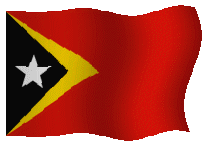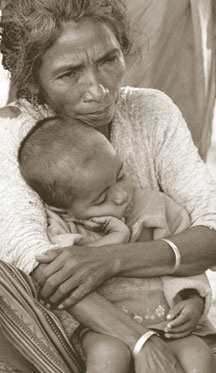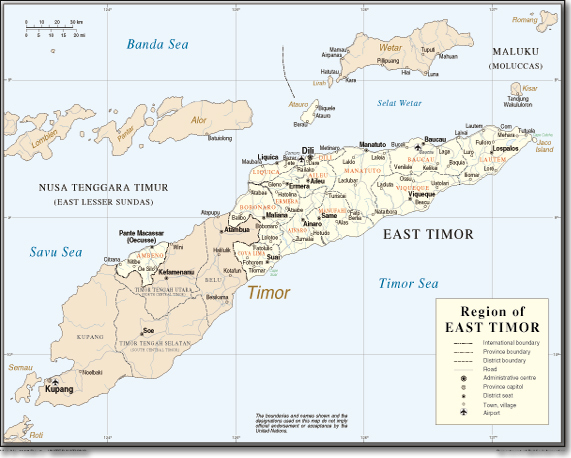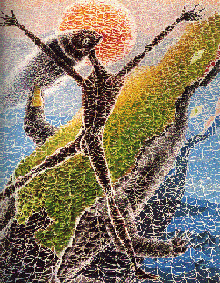



 |
 |
|
 |
 |
 |
 |
Help The Dream Become Reality. |
||
|
We have provided some brief overviews, and we have provided links to pages which contain up to date information, as well as details of the work being done by many people, and organisations to assist East Timor to transform the dream of independence, into the reality of a nation. Many of the links on this page will take you away from our site. Perhaps you would like to bookmark our page before you go? |
||
Overview. |
||
|
Located in the Indonesian archipelago at 2500 kilometres east of Djakarta, East Timor is a mountainous territory. In 1974, Portugal withdrew from this colony, and acknowledged East Timor's right to have a self-government. |
||
|
A view of East Timor. |
A civil war between rival nationalist factions, competing for independence followed. In November 1975, Fretilin, the Eastern Timor Revolutionary Front declared on its own, the independence of the 'Democratic Republic of Timor'. |
|
|
A few days later the Indonesian army invaded East Timor, annexing the region to Indonesia in July 1976. After an appalling repression, the Resistance movement fought to regain independence. From 1976 to 1982, slaughters, famine and illness resulted in the death of more than 200,000 people (about 25% of the population). From 1989 the Indonesian authorities initiated a 'transmigration policy' sending Javanese inhabitants to East Timor, and appointing the Javanese settlers to the highest offices in civil service, and depriving the East Timorese from their land. |
 |
|
Fretilin's charismatic chief Xanana Gusmao was arrested and held in custody, but the East Timorese resistance to Indonesian occupation continued. Following a change in leadership within the Indonesian government the East Timorese were offered a so called 'special autonomy' status. In August 20th 1999, the East Timorese were requested through a United Nations supervised referendum to decide on the so-called 'special autonomy' status offered to the East Timorese by the Indonesian government. Despite a widespread and violent campaign masterminded by pro-Indonesian militias, the population voted (a staggering 98% of the population defied the militias to cast their vote). Approximately 78% of East Timorese voters, supported independence, and voted against the official 'self-government plan', which triggered an outburst of violence from the Indonesian military, and pro-Indonesian militias. Nearly 50% of all East Timorese were expelled from their homes, houses were ransacked, and burnt. Many East Timorese fled to mountains, where they took refuge to escape the prevailing terror. Indonesia's parliament endorsed East Timor's independence vote, which paved the way for the half island territory to become the world's newest nation. Anti-independence militia, went on a violent rampage after the overwhelming vote in favour of independence and, destroyed much of the island's coffee crop, along with most of the country's schools, hospitals, water, power, transport and communication facilities. The United Nations Transitional Administration in East Timor (UNTAET) together with United Nations peacekeeping troops were installed to oversee the transition of East Timor to full independence. East Timor has elected an 88 member assembly, and former rebel leader 'Xanana' Gusmao won East Timor's first ever presidential election by a landslide. East Timor is now a fully independent nation. |
||
|
|
The 200,000 East Timorese who fled to the mountains, have gradually returned from Western Timor into a still uncertain climate. Most of their homes were destroyed, and the capital city of the territory, Dili, has been mostly razed to the ground. The unemployment is at 40%. |
|
Since 1999 Action Against Hunger has been working in East Timor. We can use this link to make a donation to assist Action Against Hunger's work in East Timor. |
East Timor Facts. |
||
|
||
East Timor Projects. |
||
|
The Fund for East Timor is a non-profit organization in the United States, founded to support the reconstruction and development of East Timor. |
|
A useful source of information and news in respect of projects being undertaken in East Timor is Timor Aid Social. |
|
The Projects List page on the Timor Aid Social web page, is particularly useful in understanding the scope of work being undertaken in East Timor. Small Projects range from orphanages, and street children, through to the disabled, and sufferers of leprosy. Larger projects include rebuilding and vehicle acquisition. |
||
|
Asia Pacific Support Collective, is another organisation which has been supporting grassroots initiatives in East Timor since 1999. |
|
|
The Projects page on the Asia Pacific Support Collective web page, is also useful in understanding the scope of work being undertaken in East Timor. |
East Timor's First President. |
||
|
East Timor's first elected president is former resistance fighter and now independent candidate Jose Alexandre 'Xanana' Gusmao. |
||
|
To learn more about President Gusmao, we can use these links… |
||
Detailed Map Of East Timor. |
||
 |
||
The Creation Of Timor.An East Timor Legend. |
||
 |
There was once a crocodile who had lived for many hundreds of years in a swamp and whose great dream was to grow and reach a phenomenal size. But not only was he a small crocodile, he also lived in a very confined space. Only his dream was large. A swamp, of course, is the worst possible place to live. Shallow, stagnant water, hemmed in by strange, ill-defined banks, and above all lacking in food to tempt a crocodile. For all these reasons, the crocodile was sick and tired of the swamp, but he had nowhere else to live. |
 |
|
Copyright permission is seldom withheld.
|